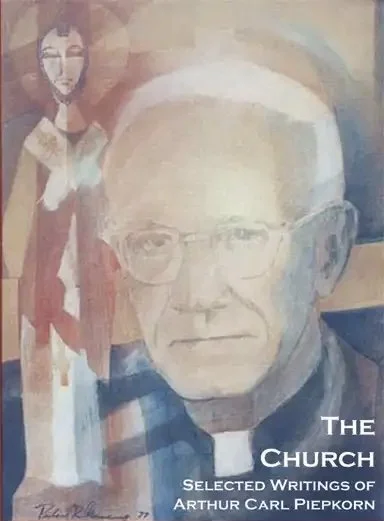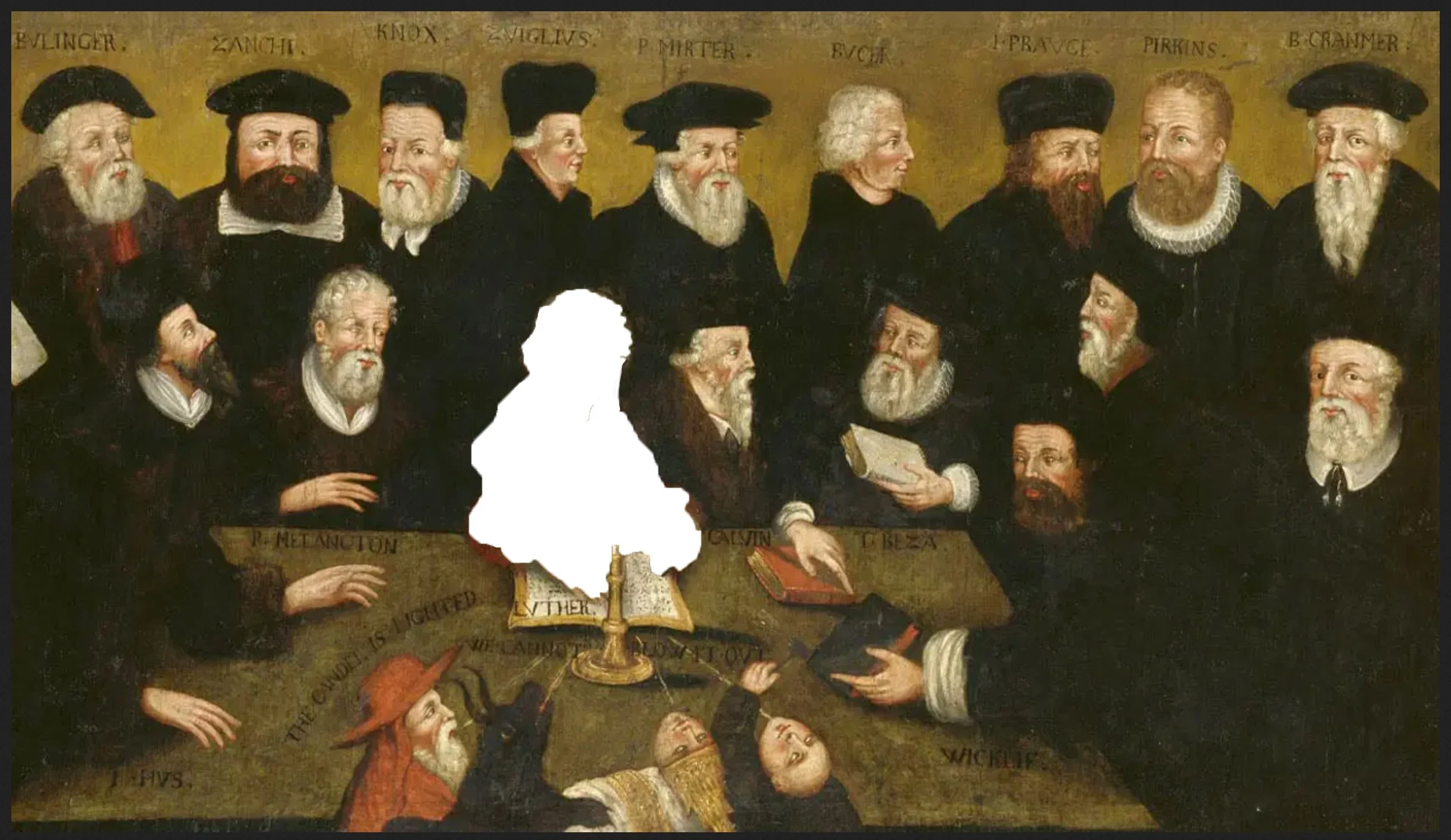A Mentor I Never Met
by John A. Nunes
Editor’s Note: Throughout 2024 Lutheran Forum online will be featuring essays by mid-20th century theologians from the Lutheran Church—Missouri Synod. The essays will also be accompanied by an editorial length reflection from a contemporary theologian in the LCMS. This is the second in that series.
Read “The One Eucharist for the One World” https://scholar.csl.edu/cgi/viewcontent.cgi?article=4929&context=ctm
Cicero, whose thinking provoked in part the faith of both Saints Augustine and Jerome, intuited rightly that there is “a certain order of things foreknown by God.”[1] In retrospect, of the figures who taught fifty winters ago at Concordia Seminary, St Louis, Arthur Carl Piepkorn’s untimely death now seems most timely, mercifully providential. Collapsing into Abraham’s bosom two months prior to the Walk Out, he was spared the agony of a divided denomination as well as decades of ensuing ecclesial disarray which now seems despairingly and permanently fixed. Excuse my grumpiness, but should we not thank Jesus that a churchman of Piepkorn’s devotion and gravitas was not forced to see the deathward sway of so much of Lutheranism—whether in the institutionalized Gnosticism of the progressive, the fundamentalist, or the lukewarm varieties.
Like our Lord’s prayer on the night in which he was betrayed, Piepkorn’s prayer and work indefatigably was directed towards the unity of the church. In a 1965 speech given at Concordia College, Bronxville, New York, and published in the predecessor volume of this journal, American Lutheran, Piepkorn suggests that ecumenical efforts are seen best as “a divine response to the prayers and longings and the suffering of members of His Body on earth.”[2] The word “Body” here is telling, polyvalent, mystical even. Moreover, “The One Eucharist for the One World,” my nominee for his optimal work, shines precisely because Piepkorn’s heart hears the hearts of the world, God’s people, and their petitions as participants in the body of Christ.
Published a year prior to his death, Piepkorn is prophetic, pastoral, and prodigiously theological: linking the incarnate Christ with the sacramental Christ with “the one world of human beings.” This linkage renders a critique—though written more than half a century ago—as masterful then as it is timelessly and grippingly matched for our age:
In our era and in our culture where we are so uncomfortably aware of a drift toward the demonic, a list toward nonbeing, a flight from integrity toward disintegration and a centrifugal thrust toward undisguised nihilism, we need as the church to be able to affirm that our whole universe hangs together in Christ.
Not only is the contemporary body of Christ, the church, inarguably fractured, but hyperpartisan politics are pursued with religiously fanatical fervor. The fastest growing religious group in our time are those who espouse No Religion and yet these are haunted by substitutes for the holy things. Piepkorn’s method refuses to be dogmatically esoteric. Instead, I love the ironic humility of Piepkorn’s posture of confidence.
Rather than identifying and labelling the dangerous types of people to be avoided—a trap I all-too-often fall into, designating those not to be tolerated—Piepkorn seems to be possessed with such trust in the Truth that he’s unafraid of “the culture.” Consistently, the Holy Spirit keeps his pen from being drawn into blaming or condemning; and when there is indignation, it is not towards people and their core dignity, but towards spiritual enemies. His utter confidence in God’s Truth compels him to write doxologically, offering a sacrifice of praise and thanksgiving to the One who sacrificed himself on the altar of Calvary. This approach permits him to love in patience the law breaker as well as the administrator of the law, since Christ, alone the law-keeper, offers himself reconcilingly to both, to all.
The prolific biblical scholar, Raymond Brown (1928-1998), once remarked on what some fellow Roman Catholics discovered upon engaging him: “We Roman Catholics on the Dialogue Committee were not prepared for Arthur Carl Piepkorn. He bowled us over not only by his immense erudition, his knowledge of the fathers of the Church—East, as well as West—, but with his knowledge also of the medieval scholastics, and not least by the profundity of his churchmanship.”[3]
Despite his voluminous learning, Piepkorn is unafraid to admit that there are things he does not understand—for example, there are certain contexts, circumstances, alienations, or rebellions that keep some from Truth. As a churchman and scholar, his instinct is to respond by digging for historical explanations. Yet, the body and blood of Christ, which we plead and receive for our salvation, is greater than even these.
Despite his reverential elegance of language, the painstaking attention to syntax, he resists an affected, elite doctrinal theology disconnected from everyday people. Instead, there is an invitation in his prose to those who dispose of “trash and litter” and who care for little children; as such ordinary people and their quotidian vocations are honored.
Despite his encyclopedic familiarity with liturgical texts, his references to formal prayers do not seem formulaic or pedantic. His liturgy bursts dynamically with song. Those who really know can correlate liturgy with culture. His method does not dwindle woodenly, is not (to put it sarcastically) declaimed mechanically in perfunctory propositions from a page in the front section of the latest, putatively pure hymnbook. Like the sacrament, this Word is alive. Some college students I know might say, “electric!”[4]
I only had the chance to know Piepkorn derivatively, second-hand, through his students and through his writings. This essay is my favorite. But had he not died so soon (I was 10 years old), I’d like to think I would have inquired about this habitus of doing theology from a place of Lutheran confidence. The Symbols, his preferred term for the Confessions, were so much more than a historically symbolic source of quia subscription; they were regarded by him as durably true, enduringly containing the catholic faith, for translating the tradition, necessarily and veraciously evangelical—Gospel-centric!—daringly up to the task of engaging the most controversial and burning questions of his time, our time, any time. For example, as early as the late1940s, Piepkorn was a participant with his colleague from Concordia Seminary, St Louis, Professor Martin Scharlemann, in the Chicago Society for Better Race Relations founded by LCMS pastor Andrew Schulze.[5]
As such, “The One Eucharist for the One World” has multiple unforced references to race relations. In the final vision, the true body and true blood of Christ does not remain elevated for adoration, but also goes out where God’s people go, to serve and to unite “a great multitude that no one could count, from every nation, from all tribes and peoples and languages, standing before the throne and before the Lamb, robed in white, with palm branches in their hands.” With Arthur Carl Piepkorn, they cry out with a loud voice: ‘Salvation belongs to our God who is seated on the throne and to the Lamb!’” (Revelation 7:9-10).
Read “The One Eucharist for the One World” https://scholar.csl.edu/cgi/viewcontent.cgi?article=4929&context=ctm
Notes
[1] Augustine, City of God, 5.9
[2] “The Church of the Reformation In this Age of Dialogue,” American Lutheran, vol 48, no 10 (October 1965): 6.
[3] https://piepkorn.org/piepkorn-biography/beloved-legendary accessed December 13, 2024
[4] I’d like to make a separate argument sometime that his work verges being a high-church Pentecostalism.
[5] James W. Albers, “Stories of Lutherans and Race: A Bibliographic Retrospective” The Cresset Michaelmas 2006 (Vol LXX, No. 1, p 20-28).



